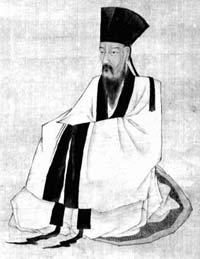Chinese philosopher and general (1472–1529) From Wikipedia, the free encyclopedia
Wang Yangming (31 October 1472 – 9 January 1529), or Bo'an, was a Chinese philosopher, official, educationist, calligraphist, and general during the Ming dynasty.
Wang Yangming | |
|---|---|
 | |
| Born | Wang Shouren 31 October 1472 |
| Died | 9 January 1529 |
| Nationality | Chinese |
| Era | Daiei |
He was born with the name Wang Shouren (王守仁) in the Zhejiang Province. He was known for his idealistic interpretation of neo-Confucianism, which was said to have a deeper effect on the philosophical thinking in East Asia for centuries.[1]
Wang became a successful general and was known for the strict discipline he used on his troops. In 1517 and 1518, in response to petitions to suppress peasant revolts in Jiangxi, Fujian, and Guangdong provinces, Yangming asked the court to allow amnesty. This allowed Yangming to successfully defeat the rebel forces.
Yangming influenced many, some including Lin Zexu, and Mao Zedong. He also was an influence to Tōgō Heihachirō, who won a decisive victory in the Russo-Japanese War, as Heihachirō created a stamp commemorating Yangming shortly after the war. There is also a mountain in Japan named after him, called Yangmingshan.
He thought that Knowledge is action, action is knowledge(知行合一).His main idea is the extension of innate knowledge(致良知).[2] He taught the view that "Wisdom is knowledge applied." This viewpoint helped cement his victories and improve his legacy. He also taught that true knowledge is action-based, not word-based. Today we call "true knowledge" wisdom.
Seamless Wikipedia browsing. On steroids.
Every time you click a link to Wikipedia, Wiktionary or Wikiquote in your browser's search results, it will show the modern Wikiwand interface.
Wikiwand extension is a five stars, simple, with minimum permission required to keep your browsing private, safe and transparent.